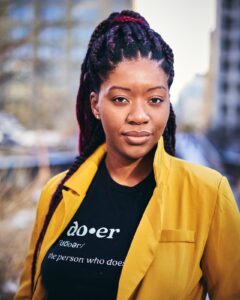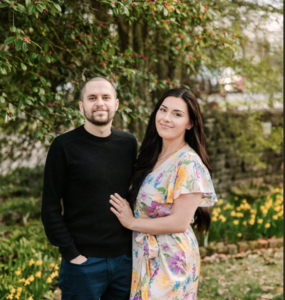Asmita Sen is a writer whose journey has been shaped by a near-death experience (NDE), a rare and life-threatening reaction to epilepsy medication, and years of navigating complex trauma. Diagnosed with epilepsy at age 12 and surviving Stevens-Johnson Syndrome (SJS) and Toxic Epidermal Necrolysis (TEN), she emerged from physical and psychological battles with a profound need to write. Through poetry, blogging, and storytelling, Asmita has turned pain into a powerful creative force. In this piece, she shares how writing became both a survival tool and a philosophical exploration of her life.

What inspired you to write about your near-death experience and your epileptic condition?
There wasn’t one singular moment that sparked my inspiration. After I experienced a near-death experience (NDE) in 2012, I felt deeply isolated. For me, the aftermath was stronger than the event itself. While I was enduring the trauma of Stevens-Johnson Syndrome (SJS) and Toxic Epidermal Necrolysis (TEN), I had my family’s full attention. That emotional support gave me the mental strength to fight and come back to reality—I didn’t want to give up because of how attached I was to my family.
After about four months of treatment, I was stable and functioning in society. But on the inside, I was dealing with undiagnosed PTSD. I quickly became emotionally dependent on my family, but they didn’t want to talk about my NDE—and I understand that now. When I realized I wasn’t getting the answers I needed, I started looking for them in strangers, which led to cyberbullying and more anxiety. I was also unknowingly projecting my trauma onto friends and acquaintances.
I began self-harming at a young age. When I felt myself spiraling again—this time mentally—I started blogging at age 14. Because of my medication, my speech was often slurred, and I was made fun of. But writing gave me a space free of judgment. I had nothing to lose. Writing was the only place that welcomed me. I wrote endlessly.
It’s funny now to think back to when my father thought I was plagiarizing my poetry—he couldn’t believe the words were mine. He was often in disbelief at the depth of my writing.
As for epilepsy, it’s deeply intertwined with my NDE. I was diagnosed at age 12 and prescribed medication that triggered SJS and TEN. My survival chances were nearly zero. My skin blistered and shed, I was blind for two weeks, I couldn’t wear clothes or move, and I had a seizure that nearly killed me. I had to be revived.

What are the most challenging aspects of sharing your personal truth through storytelling?
All of it is challenging. None of it is easy. I’ve chosen a path filled with hardships, breakdowns, erratic income, and complicated relationships. But I write for myself first. Only recently have I started to think about an audience or a niche.
I believe personal truths are universal—because pain is universal. And when pain is paired with emotion, beauty, joy, morbidity, philosophy, and the fear of mortality, it can be deeply understood. But that doesn’t mean it gets easier. It’s still hard every time.
How has introspection shaped the way you write your story?
I didn’t realize I was writing as a form of purging until after I published my first book, Spirits of the Roaring Sea. I was writing during my worst emotional breakdowns or after an epileptic episode. I had no real structure—I just wrote in survival mode.
That worked during my teen years. But later, I stopped reading or reflecting on my own writing. I was almost ashamed of it. Publishing felt like exposing my madness to the world.
Over time, I’ve learned to balance what feels like “complete insanity” and “tremendous euphoria.” I ground myself through conversations with close friends and family. I’ve also stopped projecting my pain onto others. Now, I choose my words carefully, knowing that once you write something, you start to believe it. As an emotional-philosophical writer, I try to place myself thoughtfully within my work.
What role did epilepsy play in shaping your perspective and creativity?
I didn’t write much about my epilepsy at first. It took time to accept it. I’ve never felt normal—and still don’t. I’ve had public seizures at school, college, and the gym. The pain wasn’t the hardest part; the embarrassment was.
Writing about epilepsy, especially through layered philosophical narratives, gives me a sense of power. An epileptic episode is less than death but more mysterious than life. Breaking it down helps me process it. In a way, I’m creating real magic.
How do you find motivation when rewriting feels overwhelming?
When I need to rewrite something—an outline, poem, or full draft—I let myself feel defeated for a while. But eventually, I hit a point where I know that if I don’t write, I’ll unravel. Writing brings me clarity, and that clarity sustains me.
What strategies help you convey the otherworldly aspects of your condition?
I don’t rely on a single strategy. I read authors who understand pain and complexity—Dostoevsky, Kafka, Plath, Pastan, Bukowski, Freud, Nietzsche, Hemingway. I consider them friends.
Their work helps me break down my own emotions. Writing feels like studying my own brain, especially when the medication makes me feel dissociated. I’m on heavy, lifelong meds. Sometimes I feel like I don’t even exist. Writing brings me back to myself.
How do you manage the emotional and mental toll of your condition and writing about it?
I’m still learning how to manage it. It’s hard. People say my writing is “too morbid,” but no one writes that way on purpose. Many serious writers share a common thread: pain. Our intense, layered experiences need to be expressed. Who else is going to listen?
Therapy is expensive and often inaccessible. I’m one of those rare cases with no clear solution—and only I can figure it out. The path is emotionally exhausting, but it’s also deeply cathartic.
What advice would you give women facing health challenges who want to share their stories?
Take it slow. The world rewards hustle, but don’t force yourself to keep up with a world built on convenience. Learn about yourself. Know your triggers and remove yourself from harmful situations. Strengthen your sense of self.
When you do share your story, do it with passion, rage, joy, and honesty. But never compromise your skills or your worth. Do it for yourself.
How do you stay consistent in your writing despite obstacles?
The obstacles fuel my writing. Honestly, I don’t know how else to live. Even when I take breaks, I always return to writing. It’s not negotiable. I’ve made it clear to my family: I will keep writing books, blogs, and articles for as long as I can.
What has been the most rewarding part of sharing your story?
I’ve met like-minded authors, writers, and academics who’ve expanded my world. Their support and conversations have kept me grounded.
Can you share a moment when your writing felt especially empowering?
Writing about my NDE. I had repressed most of it until I began putting it into words. I researched, asked my family questions, and wrote about what it felt like to not remember it. I felt betrayed—like no one had told me the whole truth. That rage felt powerful.
How do you navigate feelings of being underestimated?
For a long time, I internalized it. After I turned 18, I shrank myself to fit others’ comfort. My past was rarely acknowledged—especially my epilepsy.
Now, I’m finally standing up for how I feel. I write about it when I need to. I speak about it when I can. And I’m building my confidence from within.
What themes do you explore in your upcoming book?
My next book is a semi-fictional philosophical story featuring Greek mythology and inspired by Dostoevskian themes. Through it, I hope to explore my NDE using layered, multifaceted philosophies.
Every reader will interpret it differently—and that’s the beauty of it. I want people to see themselves in the work.
How do you balance personal reflection with writing for others?
I’m still figuring that out. It’s hard to separate my voice from the audience’s needs. But I’m committed to honing my craft without selling out. I don’t want to lose the essence of why I write.
Any final advice for women using their life experiences in their creative work?
Be cautious. Some people will try to exploit your story. Take time to learn the publishing landscape. Know your rights as a writer. Don’t rush.
If you’re writing about family, use layered metaphors. Protect yourself through your craft. And always, always read more.
🌐 Website
asmitasen.com
📸 Instagram
@asmitasenwrites
🐦 X (formerly Twitter)
@notyourassmita
💬 Threads
@asmitasenwrites
✍️ Medium
medium.com/@asmitasen23
💼 LinkedIn
Asmita Sen on LinkedIn






